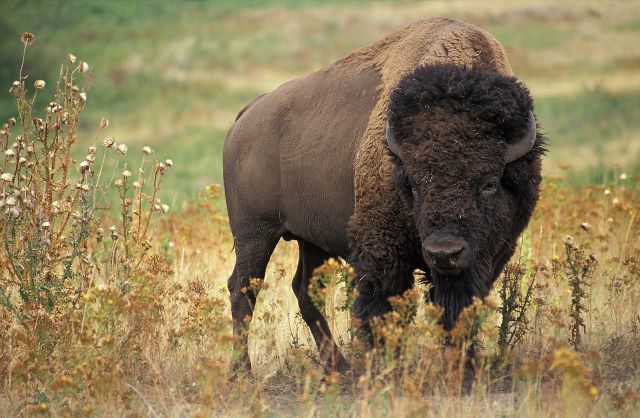
Aaniiih Nakoda College, located in Fort Belknap, announced the launch of its first-ever four-year bachelor’s degree program in Aaniih Nakoda Ecology in February 2020.
The curriculum development process for the program was initiated by the college’s faculty and administrators in 2017 and was supported by a grant from the American Indian College Fund.
The degree program offers students coursework, field-based instruction, internship opportunities, and undergraduate research.
It also provides students with an opportunity to explore the connections between the Aaniinen and Nakoda and the Fort Belknap Indian Reservation.
In a recent press release, the college announced that it had received a grant of $3.5 million from the National Science Foundation to establish a Buffalo Research and Education Center over five years. (Photo caption: Jack Dykinga, Agricultural Research Service, the research agency of the United States Department of Agriculture).
The center is focused on ecological research on the Fort Belknap bison herd and aims to empower faculty and students to become better stewards of the environment, animal relatives, and land.
The center is set up to collaborate with the Fort Belknap Indian Community Buffalo Program, Fish and Wild Life Department, World Wildlife Fund, Little Dog Wildlife, and visiting faculty fellows from the Smithsonian Conservation Biology Institute.
Students will have access to undergraduate research opportunities, a one-year fellowship to work with the Smithsonian Conservation Biology Institute, conduct outreach programs in local schools to provide engaging opportunities for youth to learn about the reservation’s plants, animals, and ecosystems, and establish a tribal buffalo community of practice.
The center will conduct research projects that include monitoring bison herds to determine how resource selection and social interactions influence herd movement.
Additionally, it will conduct a buffalo-rangeland study correlating herd movement data with vegetative surveys, determine survival rates, and home-range estimates for the reintroduced swift foxes, and develop survey protocols.
The center will also conduct population surveys of Fort Belknap’s hoofed mammal species and examine the keystone effects and associations between prairie dogs and grassland birds.
The center will provide community educational opportunities that include developing a curriculum for bison, grassland, and wildlife ecology courses to create a specialized option within the college’s ecology degree program.
In January 2022, Daniel Kinsey, a faculty member at Aaniiih Nakoda College and co-author of “The Potential of Bison Restoration as an Ecological Approach to Future Tribal Food Sovereignty on the Northern Great Plains” published in Frontiers in Ecology and Evolution, expressed that buffalo are central to their community.
Kinsey said they are fortunate to have such a successful program that is a product of hard-working people.
Kinsey also aims to connect younger generations to the buffalo and the ecosystem and to incorporate traditional knowledge into current research.
The college recently established a new ʔíítaanɔ́ɔ́nʔí/Tatag ́a (bison in Aaniiih and Nakoda languages, respectively) Research and Education Center for this purpose.
New Research: The Potential of Bison Restoration as an Ecological Approach to Future Tribal Food Sovereignty on the Northern Great Plains: Future climate projections of warming, drying, and increased weather variability indicate that… https://t.co/2DZ8MCH5p8 #Ecology
— Frontiers in Ecology & Evolution (@FrontEcolEvol) February 1, 2022
The U.S. Army Corps of Engineers has been tasked with…
Brown and Caldwell, a leading environmental engineering and construction firm,…
Humboldt State University, one of four campuses within the California…